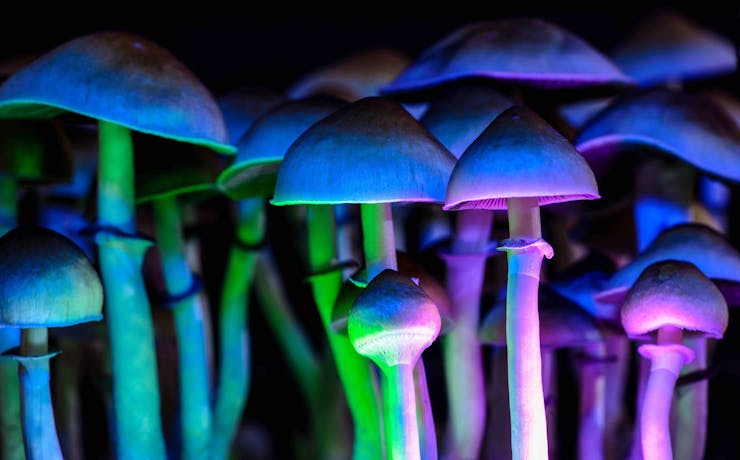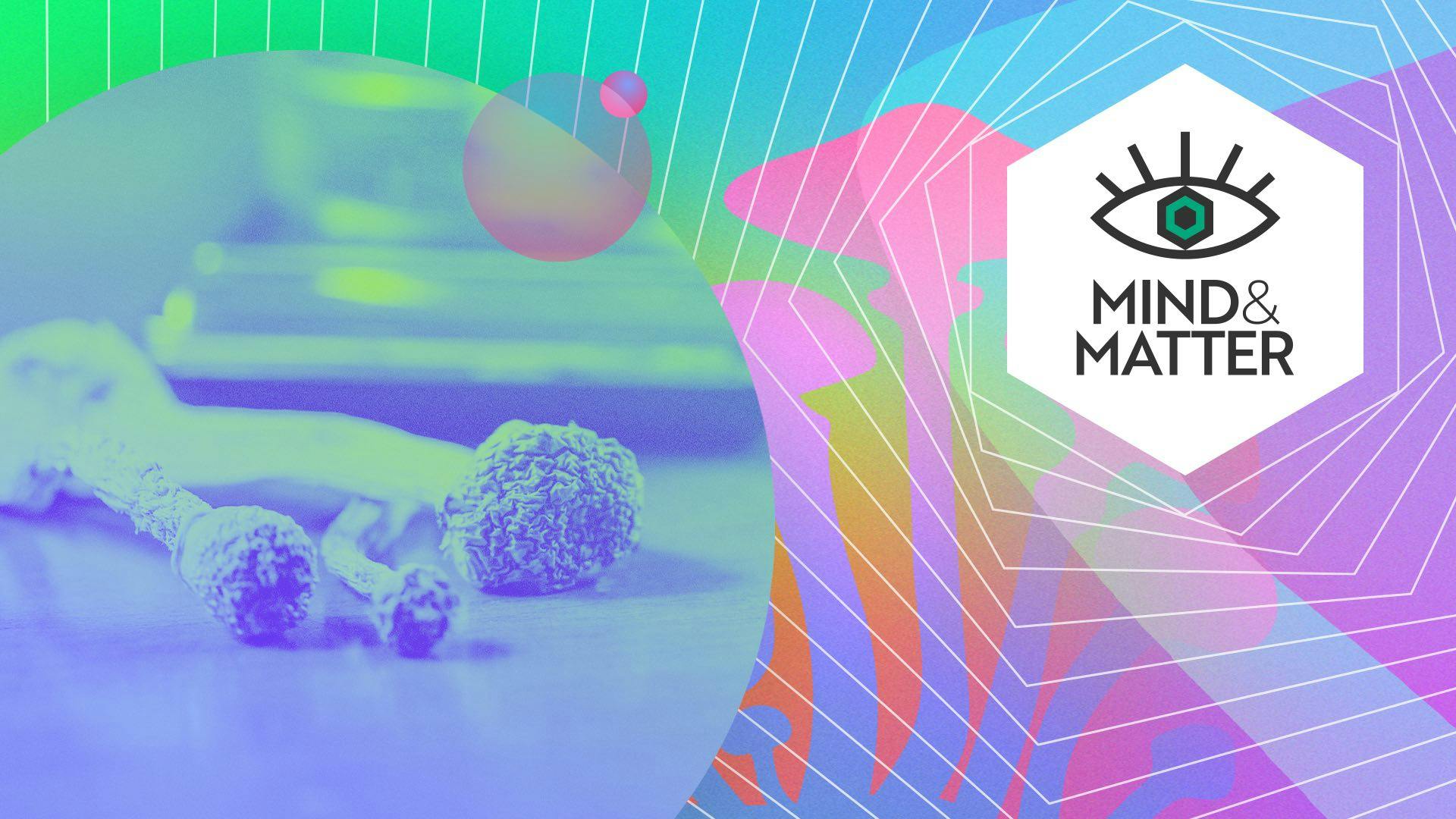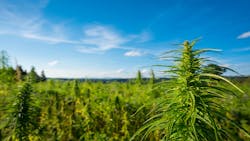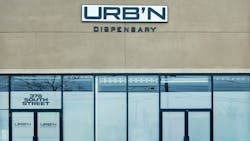Zide Door’s front door faces the street in an industrial section of Oakland, California. But the portal into America’s only openly operating psychedelic mushroom access point is completely unmarked. Because this self-described Church of Entheogenic Plants doesn’t advertise or proselytize.
In fact, it took an Aug. 2020 raid by the Oakland Police Department to put them on the map—literally. Prior to that, you couldn’t locate Zide Door anywhere on the internet, including Google Maps.
Walking into Zide Door today, a seasoned cannabis reporter can’t help but recall the early days of medical marijuana in California. In that earlier era, even dispensaries in the friendliest jurisdictions faced the daily threat of a law enforcement raid.
The first wave of cannabis retail didn’t look like today’s Apple stores. And there’s a reason for that: They were usually run by someone with one foot in the underground market and the other in civil disobedience. They started those pioneering collectives with modest funds and a reasonable expectation that “the man” could show up unannounced at any moment, slap on the handcuffs, and seize everything in sight.
Stepping into the legal psychedelic future
Security at Zide Door is friendly, but also well-equipped to deal with any potential problems. To join the church (40,000 people have), you must show up in person, be 18+ with a valid government-issued ID, and sign a waiver declaring that you’re not a law enforcement officer or informant, and that you accept entheogenic plants as part of your religion.
Aside from some well-worn furniture, a small altar for the sermons, and a few decorative flourishes, the place looks like a basement punk rock club.
In a back room, past the pulpit and pews, a series of display cases offer an array of cannabis and psychedelic mushrooms. The mushrooms come dried, blended into chocolate bars, or as a tea. They’re all cubensis—which can be cultivated efficiently indoors—but like cannabis strains they come with a wide selection of colorful names. On this day the menu offered 14 varieties, including Avery’s Albino, Golden Teachers, and Cambodian.
According to the knowledgable and attentive church members behind the counter, the most common questions are: How will this make me feel? How much should I take?
The answers: “that depends” and “that depends.”
A church pamphlet goes into greater detail on everything from the history of religious use, to proper dosage, set and setting, setting intentions, and the church’s Doctrine of Religious Evolution which borrows heavily from Terrence McKenna’s “Stoned Ape Theory.”
Entheogens: legalized, but not yet legal to sell
With government-licensed, taxed, and regulated cannabis now well established in many US states, it’s important to remember that the movement to end cannabis prohibition has a long history of engaging in civil disobedience—including providing cannabis as a medicine and even a religious sacrament in what can best be described as grey-market conditions.
Psychedelic mushrooms and other entheogenic plants and fungi appear to be taking that same journey.
In May 2019, voters made Denver the first city to decriminalize psilocybin, the active ingredient in “magic” mushrooms. Over the next two years other cities followed: Oakland,Santa Cruz, Washington, DC, and a few small towns in Massachusetts all passed similar laws. Other municipalities—including large cities like Denver and Detroit—have enacted measures making laws against psilocybin and other entheogens the lowest priority for law enforcement.
While these laws effectively decriminalize possession and consumption, there’s currently no state or municipality that permits or regulates commercial cultivation, distribution, or sales.
Pioneers already appearing
Despite that, however, a number of underground “brands” have popped up in areas with decrim laws, many of which supply value-added products like mushroom chocolates.
In Oregon—where all drugs have been decriminalized—a separate law (Oregon Measure 109) passed by voters in Nov. 2020 actually legalized psilocybin statewide. The Oregon Health Authority is currently working out regulations for sales and distribution, which per the voter initiative will allow psilocybin for “personal development” with the mushrooms grown and administered only in licensed environments.
A state advisory board overseeing implementation of the new law has a Jan. 2023 deadline to have the program up and running.
Zide Door founder got his start in cannabis
The church’s founder, Dave Hodges, dresses and speaks very much like the computer repair technician he once was, before diving into California’s “wild west” grey-market medical cannabis industry back in 2009.
When Hodges opened The San Jose Buyer’s Collective that year, he operated without a local license because no such license existed.
“My business plan,” he says, “was that we were going to get raided within the first six months, and then fight a legal battle to change the law. But it didn’t happen like that.”
Instead, within six months, Hodges watched as dozens of other clubs popped up in his wake. When local officials decided to push back against the tide, he was among their first targets. In 2010, the San Jose Cannabis Buyer’s Collective sued the city, accusing them of illegally coercing landlords to evict medical cannabis collectives from their properties. That lawsuit was not successful, but Hodges managed to hold the line until 2015, when San Jose adopted a strict ordinance governing medical cannabis that pushed him out of town.
Oakland is the cradle of progress once again
Four years later Hodges resurfaced in Oakland. In Jan. 2019, he opened the doors at Zide Door. At first he supplied only cannabis. For the previous 15 years, unlicensed cannabis clubs had been operating in Oakland under the auspices of Measure Z—a local, voter-approved ordinance that directs the police to treat marijuana enforcement as their lowest priority.
But Hodges went a step further by setting up a church and claiming religious freedom under federal law to consume and supply cannabis on the premises. The church is decidedly non-denominational, and wholly free of dogma, but they do hold sermons and provide educational outreach. Hodges says his church is 100% sincere, even if it did begin as a Halloween costume.
It’s true: He first dressed up as a preacher from his self-proclaimed Church of More Pot for a costume party. But when he took the act to Burning Man the next summer, something unexpected happened.
“People wanted the religion to be a real thing.”
In time, so did Hodges.
June 2019: Oakland decriminalizes entheogens
Six months after Zide Door opened, an unrelated psychedelic activist group called Decriminalize Nature Oakland convinced the city council to unanimously pass a resolution to effectively decriminalize psychedelic mushrooms and certain other entheogenic plant medicines as part of a growing wave of successful local efforts to decriminalize psychedelics, along with the decriminalization of all drugs in Oregon.
“Entheogenic means for religious use,” Hodges says. “So when Oakland passed that resolution, it was a sign. I had been interested in mushrooms for a long time, but still hadn’t tried them.”
You’ll forgive a seasoned cannabis reporter for double checking on that.
Here’s the founder of America’s only openly operating psychedelic mushroom church, who defiantly re-opened the doors a day after a traumatizing and expensive police raid, saying he tried mushrooms for the first time less than three years ago?
“I felt drawn to them for a long time, but the reason I hadn’t tried them was I wanted to prove to myself and anybody looking at me that cannabis doesn’t lead to other drugs.”
Entheogenic, by the way, actually does come from the Greek word entheos, which means divinely inspired, filled with the spirit of god.
‘They say things align with the mushrooms’
After decades of smoking “up to two ounces of cannabis a day,” Hodges decided he’d disproven the gateway theory. And anyway, he couldn’t very well have the church start supplying mushrooms and incorporating them into its sermons without trying them first.
And so began a journey that took him from micro doses to macro doses to heroic doses and beyond. He describes a series of encounters with “entities on the other side,” who he says offer him guidance and support in his own life and in operating the church.
“My intent is to try to understand religion and where it comes from. It’s now clear to me that our quick evolution from monkeys to what we are today was guided not only by these mushrooms, but by entities on the other side who wanted to offer aid. They say things align with the mushrooms, and they definitely do when you’re on the right path.”
Welcoming the legal challenge
Assuming these otherworldly entities encountered after eating 30 grams of psychedelic mushrooms don’t produce evidence that’s admissible in court, the question of whether or not the practices carried out within the Church of Entheogenic Plants will meet the standards of the religious freedom exemption enshrined in federal law remains an open question.
Case law on the matter is far from settled, as Hodges readily acknowledges. Which is another reason he’s eager to sue the city of Oakland over the 2020 raid. In that action, police seized money, cannabis and mushrooms—but in the 18 months since there have been no criminal charges filed.
“If we can win a federal ruling against a local police department for going after our church, then we can open anywhere in the nation,” says Hodges. “And we plan to.”








